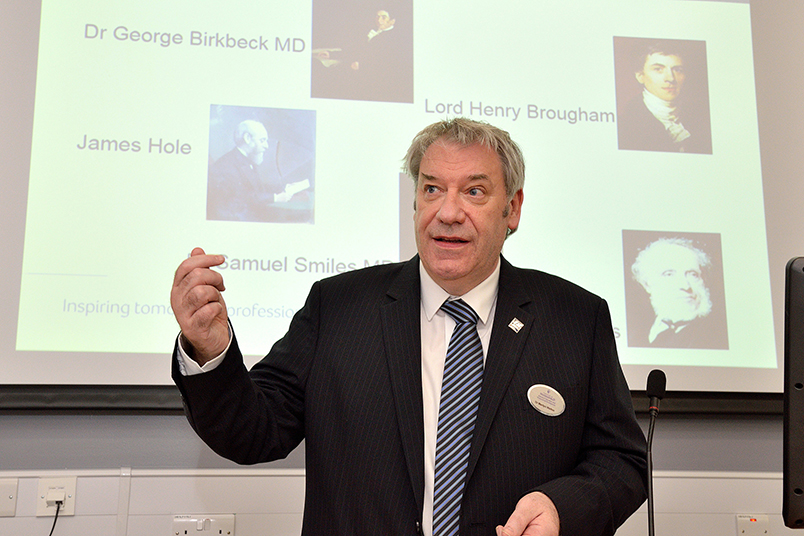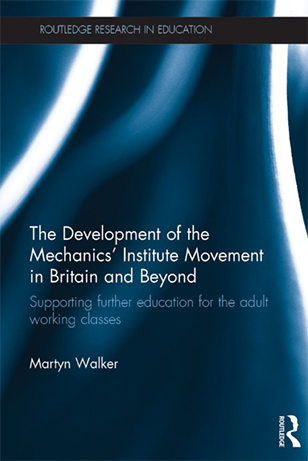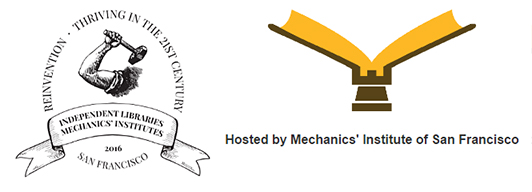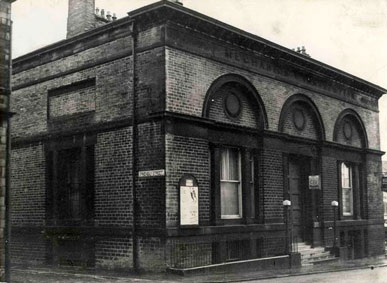History of the Mechanics’ Institutes takes researcher to the USA
 Dr Martyn Walker delivers his lecture at the University’s 175th Anniversary Lecture Series
Dr Martyn Walker delivers his lecture at the University’s 175th Anniversary Lecture Series
Mon, 05 Sep 2016 12:44:00 BST
 “…the mechanics’ institute movement provided a firm foundation on which further and higher education has subsequently been developed…”
“…the mechanics’ institute movement provided a firm foundation on which further and higher education has subsequently been developed…”
 MECHANICS’ institutes were an initiative with British roots that spread around the world during the 1800s, offering educational opportunities to working-class men and women and providing industry with the skills and flair it needed. They powerfully influenced the development of modern technical and higher education.
MECHANICS’ institutes were an initiative with British roots that spread around the world during the 1800s, offering educational opportunities to working-class men and women and providing industry with the skills and flair it needed. They powerfully influenced the development of modern technical and higher education.
At the University of Huddersfield – directly descended from an institute founded in 1841 – Dr Martyn Walker (pictured right) is a leading researcher of the movement and its legacy. His new book on the subject is now published and he will deliver a keynote lecture at a major conference in the USA.
Dr Walker is a Principal Lecturer based in the University’s School of Educational and Professional Development, and says that one of the goals of the book – titled The Development of the Mechanics’ Institute Movement in Britain and Beyond – is to provide today’s educationalists and trainee teachers with special insights.
“It is not just about history, it’s a book about social science, and for people in education it is a guide to our heritage,” said Dr Walker, who often finds that trainee teachers have an appetite for learning about the origins of their profession.
In the book he concludes that: “The history of education not only provides insights into the educational past but also helps to explain how present day developments have been established as well as having a deeper understanding of the function that education fulfils today”.
Dr Walker’s book appears towards the end of a year in which the University of Huddersfield has been commemorating the 175th anniversary of the foundation of its predecessor institution, which became one of the largest and most successful mechanics’ institutes in the North of England. It eventually occupied large, purpose-built premises which – as the Ramsden Building – remain an important component of the modern-day campus.
The first mechanics’ institute was founded in Glasgow in 1823. The philosophy of its first president, Dr George Birkbeck, would have a big influence on a movement that spread worldwide. Dr Walker includes a chapter on the development of institutions overseas, including the USA, which to this day places great value on the legacy of its mechanics’ institutes and their libraries.
 In November, the International Conference of Independent Libraries and Mechanics’ Institutes holds its 2016 gathering in San Francisco, hosted by the city’s Mechanics’ Institute. The event is titled Reinvention: Thriving in the 21st Century and Dr Walker has been invited as one of the international speakers. His talk will be titled No More Admirable Building Could be provided for Such a Purpose’: A Study of Several Mechanics’ Institutes and How They Have Been Adapted for Twenty-First Century Britain.
In November, the International Conference of Independent Libraries and Mechanics’ Institutes holds its 2016 gathering in San Francisco, hosted by the city’s Mechanics’ Institute. The event is titled Reinvention: Thriving in the 21st Century and Dr Walker has been invited as one of the international speakers. His talk will be titled No More Admirable Building Could be provided for Such a Purpose’: A Study of Several Mechanics’ Institutes and How They Have Been Adapted for Twenty-First Century Britain.
Dr Walker’s new book includes chapters that describe the origin of the institutes; the scientific and technical education they offered before 1850 and then after the Great Exhibition of 1851; the social class of members; the educational opportunities offered to women; the expansion of the movement beyond Britain; plus an analysis of the legacy of the institutes.
 He also analyses clusters of mechanics’ institutes, including a dense concentration of 40 that co-existed within a few miles of Huddersfield.
He also analyses clusters of mechanics’ institutes, including a dense concentration of 40 that co-existed within a few miles of Huddersfield.
A widespread view among historians is that by the mid-19th century, the institutes had failed in their aim of providing educational opportunities to the working class. In his book – and in previous articles and presentations – Dr Walker mounts a stern challenge to this orthodoxy. By taking a longer view, he writes, the book argues that after 1851 the movement was rejuvenated, successful and continued to grow.
“The mechanics’ institute movement made a substantial contribution to both elementary and technical education as well as providing a firm foundation on which further and higher education has subsequently been developed,” concludes Dr Walker.
- The Development of the Mechanics’ Institute Movement in Britain and Beyond: Supporting further education for the adult working classes, by Martyn Walker, is published by Routledge
◄ The original building of the Huddersfield Mechanics’ Institution







